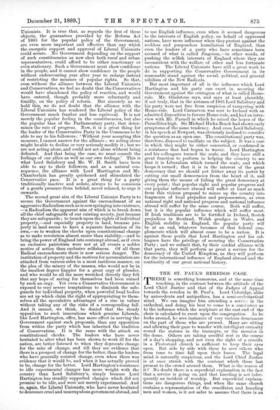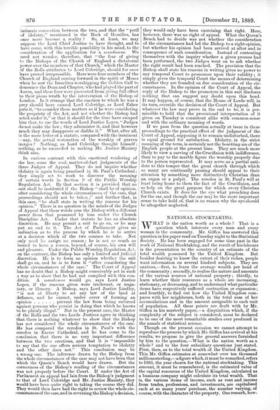THE ST. PAUL'S REREDOS CASE. T HERE is something humorous, and
at the same time touching, in the contrast between the attitude of the Lord Chief Justice and that of the Judges of Appeal towards the reredos in St. Paul's. Lord Coleridge, alike by antecedents and antipathies, has a semi-ecclesiastical mind. We can imagine him attending a service in the cathedral, and doing his best to come to a conclusion as to the influence which the sculpture at the east end of the choir is calculated to exert upon the congregation. As he looks around, he sees instances of very various demeanour on the part of those who are present. Many are sitting and allowing their gaze to wander with intelligent curiosity round the statues in the transepts, or the mosaics in the dome. Others are taking needful rest in the course of a day's shopping, and not even the sight of a crucifix in a Protestant church is sufficient to keep their eyes open. But side by side with these he sees others who from time to time fall upon their knees. The legal mind is naturally suspicious, and the Lord Chief Justice is at once struck with the contrast which these last present to the crowd around them. What is the reason of it? No doubt there is a superficial explanation in the fact that a service is going on, and that kneeling is not infre- quently an incident of worship. But superficial explana- tions are dangerous things, and when the same church contains a representation of the crucifixion and kneeling men and women, is it not safer to assume that there is an intimate connection between the two, and that the "peril of idolatry," mentioned in the Book of Homilies, has ,once more become a reality ? So, at least, we may suppose the Lord Chief Justice to have thought, and to have come, with this terrible possibility in his mind, to the consideration of the application for a mandamus. We need not wonder, therefore, that "the fear of giving to the Bishops of the Church of England a dictatorial power over the members of that Church," which the Master of the Rolls attributes to Lord Coleridge, should for once have proved irrepressible. Here were four members of the 'Church of England coming forward in the spirit of Moses when he saw the Israelites worshipping the Golden Calf to denounce the Dean and Chapter, who had played the part of Aaron, and these four were prevented from giving full effect to their pious wrath by the intervention of the Bishop of London. Is it strange that the emotion to which he was a prey should have caused Lord Coleridge, as Lord Esher puts it, "to consider these matters as if he were considering the propriety of the Act, and not whether the Bishop had acted under-it," or that it should for the time have escaped him that, to use the words of Lord Justice Lopes, "Judges do not make the law ; they administer it, and that however much they may disapprove or dislike it." What, after all, is the mere letter of a statute, compared with the imminent —nay, the actual restoration of the worship of graven images ? Nothing, as Lord Coleridge thought himself ; nothing, as he succeeded in making Mr. Justice Manisty think also.
In curious contrast with this emotional rendering of the law, come the cool, matter-of-fact judgments of the three Judges of Appeal. They do not inquire whether idolatry is again being practised in St. Paul's Cathedral ; they simply set to work to discover the meaning of certain words in Section 9 of the Public Worship Regulation Act. By that section it is provided that no suit shall be instituted if the Bishop "shall be of opinion, after considering the whole circumstances of the case, that proceedings should not be taken ;" and further that, in this case, "he shall state in writing the reasons for his opinion." There is no question in the minds of the Judges of Appeal that these words arm the Bishop with a different power from that possessed by him under the Church Discipline Act. Under that statute he has an absolute discretion. He may permit a suit to go on, or he may put an end to it. The Act of Parliament gives no indication as to the process by which he is to arrive at a decision which of the two courses to take. Not only need he assign no reason ; he is not so much as bound to have a reason, beyond, of course, his own will and pleasure. -Under the Public Worship Regulation Act, on the contrary, the Bishop has only a limited and judicial discretion. He is to form an opinion whether the suit -shall go on, and he is to form it "after considering the whole circumstances of the case." The Court of Appeal has no doubt that a Bishop might conceivably act in such a way as to show that be had not complied with this con- dition. A mandamus would go, says Lord Justice Lopes, if the reasons given were irrelevant, or nuga- tory, or illusory. A Bishop, says Lord Justice Lindley, "is not at liberty to set any law of the land at defiance, and he cannot, under cover of forming an opinion prevent the law from being enforced against persons who persist in doing that which he knows to be plainly illegal." But in the present case, the Master -of the Rolls and the two Lords Justices agree in thinking that there is nothing whatever to show that the Bishop has not considered the whole circumstances of the case. He has compared the reredos in St. Paul's with the reredos in Exeter Cathedral, and he has come to the -conclusion that there is no very important difference between the two erections, and that it is "impossible to say that the one offers serious temptation to idolatry and the other does not." This conclusion may be a wrong one. The inference drawn by the Bishop from the whole circumstances of the case may not have been that which the Queen's Bench would have drawn. But the correctness of the Bishop's reading of the circumstances was not properly before the Court. If under the Act of Parliament an appeal had lain from the Bishop's judgment to that of Lord Coleridge and Mr. Justice Monist-, they would have been quite right in taking the course they did. They would then have had the right to review the whole cir- ,eumstances of the case, and in reversing the Bishop's decision, they would only have been exercising that right. Here, however, there was no right of appeal. What the Queen's Bench had to decide was not whether the consideration of the circumstances had led the Bishop to a right opinion, but whether his opinion hail been arrived at after and in consequence of such consideration. Instead of contenting themselves with the inquiry whether a given process had been performed, the two Judges went on to ask whether the right result had been reached. The provision that the Bishop shall state his reasons in writing gives no power to any temporal Court to pronounce upon their validity; it simply gives the temporal Court the means of determining whether they are founded on due consideration of the cir- cumstances. In the opinion of the Court of Appeal, the reply of the Bishop to the promoters in this suit discloses nothing that can suggest any doubt upon this head. It may happen, of course, that the House of Lords will, in its turn, override the decision of the Court of Appeal. But whatever the law may prove in the end to be, it is per- missible to hold that the provisional interpretation of it given on Tuesday is consistent alike with common-sense and with the ordinary meaning of words.
If we pass from the question actually at issue in these proceedings to the practical effect of the judgment of the Court of Appeal, supposing it to remain undisturbed, there is equal ground for satisfaction. Idolatry, in the strict meaning of the term, is certainly not the besetting sin of the English people at the present time. They are much more likely to view a carving of the Crucifixion with indifference, than to pay to the marble figure the worship properly due to the person represented. It may serve as a partial anti- dote to this temper that the great church through which so many are continually passing should appeal to their attention by something more distinctively Christian than an organ or a pulpit. The reredos in St. Paul's will at least bring home to them the fact of the Crucifixion, and so help on the great Burpose for which every Christian Church exists. It does for the eye what preaching does for the ear, and though the ear may be the more important sense to take hold of, that is no reason why the eye should be altogether neglected.











































 Previous page
Previous page